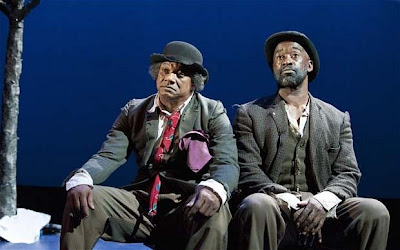VERNON
GOD LITTLE
The
New Wolsey Young Company
at
the Wolsey Theatre Studio, Ipswich
18.04.2012
Since
winning the Booker in 2003, Pierre's dark comedy has been adapted at
least twice as a theatre piece. This is the version done by Tanya
Ronder for the Young Vic in 2007. Another challenging piece for
Ipswich's enterprising young company – fourteen actors [age range
16 to 21], all of them involved in the music which is an integral
part of the show.
Director
Rob Salmon points out that gun massacres will always be topical, but
this week's trial in Oslo reminds us that they are not confined to
the USA – the play is set in the ironically named Texan town of
Martirio. The central character, described by one critic as "Holden
Caulfield on Ritalin" is thirteen in the novel.
Here,
Joe Reed plays him 16 going on 17, an angry, aggresive presence, his
name in lights behind the action, helpless as he finds himself framed
for the High School Massacre and more.
The
show begins with Jesus Navarro, the Mexican boy who flips and shoots
his classmates, singing his theme song – Patsy Cline's Crazy. It's
a powerful moment, and his shade is often present, bloody but
unbowed, a merry spirit in Mexico, a tragic figure on Death Row,
perched on the tech desk for the trial of his friend. Excellent,
intense work from Jack Tricker.
Aidan
Napier is the tv man, immoral and menacing, a well sustained, creepy
performance. Television, reality and otherwise, is a constant in this
redneck Jerry Springer world: Lally presents to camera, the lyrics of
the Country Music are flashed up on the screen, which could usefully,
and realistically, have been twice the size.
The
young cast certainly enjoyed some of the more grotesque characters,
with impressive performances from Steve Withers as, among others, an
advocate with a shaky grasp of English and a Pastor, and from Jack
Brett as the randy shrink Dr Goossens and Lally's blind mother.
Armonie
Melville was strong as Taylor, the wasted girl who frames Vernon, and
Keisha Banya brought his confused, needy Mom to frightening life.
The
staging – the johns, the chairs on wheels – was ingenious, and
the show was crackling with energy, with a wacky, cartoonish style
which suited the story. A little more light and shade, a little less
indistinct shouting, would have helped the audience follow the plot,
especially in the wordy second act.
But
the overall effect was infectiously enjoyable, the broad satire, the
foul-mouthed fights, the moral message, the music and the manic
acting adding up to a good night out for anyone, theatre-buffs or
first-timers, fans of DBC Pierre or not ...
production photo: Mike Kwasniak
this piece first appeared on The Public Reviews














